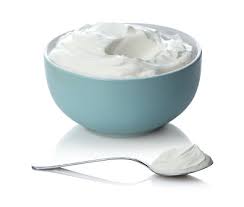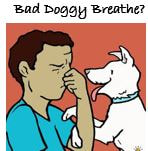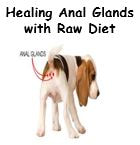Can Dogs Have Yogurt?
www.chewy.com
(A great site with some really good articles or various topics, worth a visit)

Even if you buy your dogs the top-of-the-line kibble, chances are they are always gunning for a taste of what’s on your plate. Fortunately, some human foods, such as carrots, peanut butter, and pumpkin, can provide your dog with an array of health benefits. But what about yogurt?
Health Benefits of Yogurt for Dogs
Fortunately, dogs can indeed eat yogurt. In addition to serving it as a delicious treat, yogurt has a variety of health benefits including protein, calcium and a variety of vitamins and minerals. Yogurt also has probiotics.
“Yogurt can contain live and active bacterial cultures which may contribute to a healthy gut microbiome,” says Dr. Sean Delaney. These bacteria strains, like Lactobacillus, Bifidobacterium, and Streptococcus Thermophilus, can help regulate the digestive system.
Dr. Maryanne Murphy, clinical assistant professor of nutrition at the University of Tennessee, often recommends that pet parents give yogurt to their dogs to maintain and improve gastrointestinal health.
“It is important to keep in mind, however, that unless you continue to feed yogurt, the probiotic benefit will not last long,” she says. “For general GI health, it is best to give yogurt every day, although concentrated probiotic supplements are likely going to provide a more clinically relevant result.”
Health Benefits of Yogurt for Dogs
Fortunately, dogs can indeed eat yogurt. In addition to serving it as a delicious treat, yogurt has a variety of health benefits including protein, calcium and a variety of vitamins and minerals. Yogurt also has probiotics.
“Yogurt can contain live and active bacterial cultures which may contribute to a healthy gut microbiome,” says Dr. Sean Delaney. These bacteria strains, like Lactobacillus, Bifidobacterium, and Streptococcus Thermophilus, can help regulate the digestive system.
Dr. Maryanne Murphy, clinical assistant professor of nutrition at the University of Tennessee, often recommends that pet parents give yogurt to their dogs to maintain and improve gastrointestinal health.
“It is important to keep in mind, however, that unless you continue to feed yogurt, the probiotic benefit will not last long,” she says. “For general GI health, it is best to give yogurt every day, although concentrated probiotic supplements are likely going to provide a more clinically relevant result.”

What Kinds of Yogurt Can Dogs Eat?
Delaney recommends that pet parents choose plain, unflavored, non-or low-fat yogurt. Both Greek and regular yogurt are fine for healthy dogs, he says, but warns that pet owners should choose a yogurt brand carefully, as some types contain ingredients that can be harmful to pets.
“Be sure to avoid yogurts that are chocolate flavored or use artificial sweeteners for fear that Xylitol is used which is toxic to dogs,” he says.
Delaney recommends that pet parents choose plain, unflavored, non-or low-fat yogurt. Both Greek and regular yogurt are fine for healthy dogs, he says, but warns that pet owners should choose a yogurt brand carefully, as some types contain ingredients that can be harmful to pets.
“Be sure to avoid yogurts that are chocolate flavored or use artificial sweeteners for fear that Xylitol is used which is toxic to dogs,” he says.
In general, here is a list of yogurts to avoid feeding your dog:
How to Give Your Dog Yogurt
There are many ways in which you can supplement your dog’s diet with yogurt, including adding it to their daily meals or making it an extra-special treat.
Dr. Cailin Heinze, assistant professor of nutrition at Tufts University Veterinary Department, suggests freezing yogurt and fruit or yogurt mixed with pieces of meat in an ice cube tray to make pupcicles.
Although yogurt is okay to give to dogs, Delaney warns that pet parents should not do it in excess, as it can lead to weight gain.
“Make sure to avoid overfeeding yogurt, since this is considered a treat. My general recommendation is that treats not make up more than ten percent of the total calories a dog consumes each day,” he says. “Owners should check the label on the yogurt they are using, but plain nonfat yogurt is approximately 15 calories per ounce. This means a ten-pound dog can have up to two ounces per day, as long as no other treats are also being fed.”
Any pet parent looking to incorporate yogurt in their dog’s diet should also consult with their veterinarian beforehand.
Problems with Feeding a Dog Yogurt
Some dogs have a harder time digesting dairy that others, so one thing to consider when giving your dog yogurt is whether or not he has an issue with lactose. Common symptoms of a dog having a reaction to dairy include:
If you suspect a your dog lactose issue, you should refrain from giving your dog yogurt all together. Heinze tells her clients to opt for Greek-style yogurt as this style has less lactose. “Greek-style yogurt may therefore be less likely to upset a dog’s stomach,” she says.
- Yogurt with any artificial sweeteners, especially Xylitol
- Yogurt with flavoring components
- Yogurt containing “fruit on the bottom”
- Anything that is chocolate flavored
- Full-fat yogurts
How to Give Your Dog Yogurt
There are many ways in which you can supplement your dog’s diet with yogurt, including adding it to their daily meals or making it an extra-special treat.
Dr. Cailin Heinze, assistant professor of nutrition at Tufts University Veterinary Department, suggests freezing yogurt and fruit or yogurt mixed with pieces of meat in an ice cube tray to make pupcicles.
Although yogurt is okay to give to dogs, Delaney warns that pet parents should not do it in excess, as it can lead to weight gain.
“Make sure to avoid overfeeding yogurt, since this is considered a treat. My general recommendation is that treats not make up more than ten percent of the total calories a dog consumes each day,” he says. “Owners should check the label on the yogurt they are using, but plain nonfat yogurt is approximately 15 calories per ounce. This means a ten-pound dog can have up to two ounces per day, as long as no other treats are also being fed.”
Any pet parent looking to incorporate yogurt in their dog’s diet should also consult with their veterinarian beforehand.
Problems with Feeding a Dog Yogurt
Some dogs have a harder time digesting dairy that others, so one thing to consider when giving your dog yogurt is whether or not he has an issue with lactose. Common symptoms of a dog having a reaction to dairy include:
- Diarrhea
- Vomiting
- Flatulence/abdominal gas
- Lack of appetite
- Weight loss
- Poor weight gain
- Abdominal pain and discomfort
- Itching/excessive scratching
- Poor body condition
If you suspect a your dog lactose issue, you should refrain from giving your dog yogurt all together. Heinze tells her clients to opt for Greek-style yogurt as this style has less lactose. “Greek-style yogurt may therefore be less likely to upset a dog’s stomach,” she says.
|
Sometimes the foul odour will be the result of an infection or other medical problem located in the canine's mouth, while in other cases the problem will be elsewhere in the body, simply releasing the foul smell through the animal's mouth.
|
If two dogs are wrestling and it seems too rough to you, with all that growling and snarling, body-slamming, and biting of each other’s necks, should you intervene? Can you tell the difference between playing and fighting?
|
Dogs have existed in harmony with their anal glands for thousands of years. So the question is, why now do they have anal gland issues?
|





